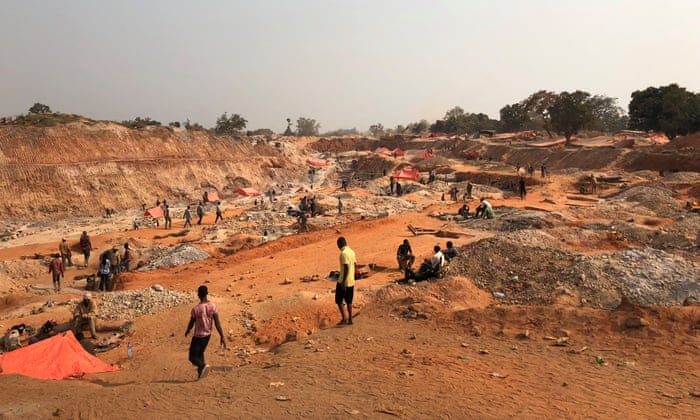
Cobalt mining site near Kasulo. Photograph: Siddharth Kara
While the electronics industry is one of the largest industrial sectors in the global economy, it is also one of the most high-risk sectors for modern slavery[1]. Producing phones, laptops and other electronics is a labour-intensive process, often reliant on low-skilled workers who earn low wages work and live in sub-standard conditions for both mining raw materials and product manufacture.
Moreover, most electronics companies depend on third-party suppliers for the provision of components, raw materials and services that form key elements of their finished products. These suppliers in turn may outsource to others, leading to complex supply chains that can comprise multiple tiers, hundreds of supplier locations and thousands of individuals. The dozens of minerals used in the production of the products have been extracted from the ground in every continent except Antarctica. All of which explains the increased risk for the electronics industry and the need to ensure due diligence in the supply chain.[2]
IAJU, the International Association of Jesuit Universities, has expressed its interest to participate in a new initiative led by University of Deusto which tries to develop a global multi-stakeholder platform for exchange of information and the promotion of responsible sourcing[3] and responsible business conduct of consumer electronic supply chains: the Holistic Platform for the competitiveness of the social sustainability of the electronic supply chains (HOPE).
The plan is to involve a network of key international experts and stakeholders, and engage all social and economic actors in developing an innovative and globally accepted concept of responsible sourcing and make sustainability the key factor that makes the consumer electronics industry competitive and ultimately profitable; where all actors have a voice, and are both provider and user of the social impact indicators the supply chain generates.
To facilitate this, HOPE has devised a global platform building strategy around 12 events all over the world, to engage exiting platforms with governmental (including public buyers), and corporate and civil society partners, as well as workers and communities affected from the EU/Associated Countries and third countries in developing a globally acceptable concept of a responsible sourcing in electronic supply chains (critical raw minerals, manufacturing, procurement and secondary use of minerals) from a holistic approach (society, industry, business, policies, ethics, gender and human rights, and technology).
CINEP, ALBOAN, SOMO, Electronic Watch, University of Greenwich, Zaragoza Logistics Center, Consiglio Nazionale delle Ricerche and University of Deusto are the core partners of this initiative that will be sent for funding to the EU-H2020 call Greening the economy in line with the Sustainable Development Goals (SDGs) [H2020-SC5-2018-2019-2020]. In case of success, the project will begin in January 2020 and will last for 36 months.
IAJU will be able to echo the advances and proposals of this platform, allowing the relationship with other research groups that are close to this societal challenge through its network of more than 200 universities and higher education centers.
[1] The 2016 Global Slavery Index by the Walk Free Foundation estimates that there are 45.8 million people in modern slavery across the world with 20.9 million people trapped in forced labour, which includes those in electronics supply chains. Exploiters from hundreds of supplier locations, including electronics manufacturing factories, will coerce or deceive labourers for financial gain.
[2] RELX Group Sustainable Development Goals (SDGs) Resource Centre
[3] Responsible sourcing, also referred to as supply chain responsibility, is a voluntary commitment by companies to take into account social and environmental considerations when managing their relationships with suppliers. This strategy is now an integral part of effective supply chain management.
